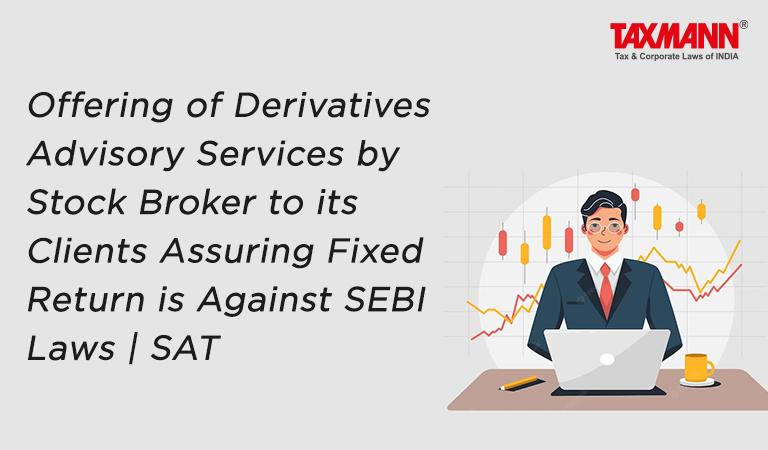Offering of Derivatives Advisory Services by Stock Broker to its Clients Assuring Fixed Return is Against SEBI Laws | SAT
- News|Blog|Company Law|
- 2 Min Read
- By Taxmann
- |
- Last Updated on 28 July, 2023

Case Details: Sameer Himatlal Shah HUF v. National Stock Exchange of India Ltd. - [2023] 152 taxmann.com 259 (SAT-Mumbai)
Judiciary and Counsel Details
-
- Justice Tarun Agarwala, Presiding Officer & Ms Meera Swarup, Technical Member
- Sandip Parikh, Adv. for the Appellant.
- Gaurav Joshi, Sr. Adv., Rashid Boatwalla & Juan D’Souza, Advs. for the Respondent.
Facts of the Case
In the instant case, ‘A’ was a registered trading member of the National Stock Exchange (NSE). The appellants had opened an account with ‘A’ and deposited various sums of money in various tranches for trading. The appellants also deposited certain shares towards margin money.
A forensic audit was conducted, which revealed that ‘A’ was offering Derivatives Advisory Services (‘DAS’) to its clients, assuring fixed returns and was potentially carrying out the same in the nature of Portfolio Monitoring Services (PMS). The forensic audit revealed that ‘A’ was offering two plans, namely, Gold and Platinum having a minimum investment of Rs. 10 lakhs and Rs. 1 crore respectively.
The Stock Exchange thereafter declared ‘A’ as a defaulting trading member and accordingly, expelled ‘A’ as a stockbroker from the exchange. The appellants lodged a claim for payment of Rs. 58.71 lakh under the Investor Protection Fund.
The said claim was found to be inadmissible and was rejected by the Member and Core Settlement Guarantee Fund Committee of NSE. A review application was filed, which was also dismissed as not maintainable. The appellant then filed an appeal before the Securities Appellate Tribunal (SAT).
It was noted that the appellants had sold and purchased shares through transactions on the Stock Exchange platform and the broker i.e. ‘A’ had given payouts and there were ample evidences to indicate that payouts received by appellants were in the form of an assured return, which was prohibited.
SAT Held
The SAT observed that under Rule 8(f) of the Securities Contracts (Regulation) Rules, 1957, no person is eligible to be elected as a member if he is engaged in any business other than that of securities or commodity derivatives except as a broker or agent who is not involved in any personal financial liability.
The SAT, further observed that the offering of DAS to its clients which included the appellants assuring fixed returns was prohibitive and, therefore, the claim was not permissible under the Investors Protection Fund under Chapter XIII of the Bye-Laws.
The SAT held that the offering of Derivatives Advisory Services (DAS) assuring fixed return is against the Rules, Regulations, Bye-Laws and Circulars of SEBI.
The SAT, further held that since the appellants were receiving assured return, the claim to receive compensation from Investor Protection Fund was inadmissible. Therefore, an appeal against the impugned order passed by the Member and Core Settlement Guarantee Fund Committee rejecting the claim of the appellant, was to be dismissed.
Disclaimer: The content/information published on the website is only for general information of the user and shall not be construed as legal advice. While the Taxmann has exercised reasonable efforts to ensure the veracity of information/content published, Taxmann shall be under no liability in any manner whatsoever for incorrect information, if any.

Taxmann Publications has a dedicated in-house Research & Editorial Team. This team consists of a team of Chartered Accountants, Company Secretaries, and Lawyers. This team works under the guidance and supervision of editor-in-chief Mr Rakesh Bhargava.
The Research and Editorial Team is responsible for developing reliable and accurate content for the readers. The team follows the six-sigma approach to achieve the benchmark of zero error in its publications and research platforms. The team ensures that the following publication guidelines are thoroughly followed while developing the content:
- The statutory material is obtained only from the authorized and reliable sources
- All the latest developments in the judicial and legislative fields are covered
- Prepare the analytical write-ups on current, controversial, and important issues to help the readers to understand the concept and its implications
- Every content published by Taxmann is complete, accurate and lucid
- All evidence-based statements are supported with proper reference to Section, Circular No., Notification No. or citations
- The golden rules of grammar, style and consistency are thoroughly followed
- Font and size that’s easy to read and remain consistent across all imprint and digital publications are applied



 CA | CS | CMA
CA | CS | CMA
